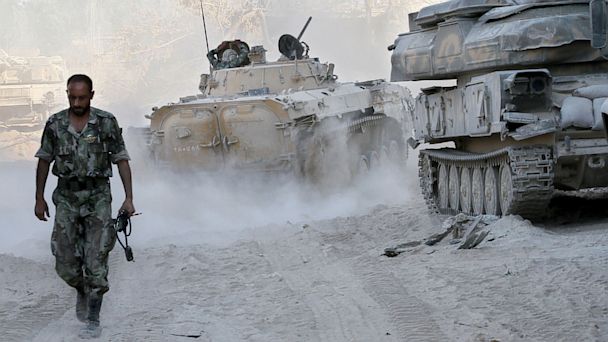Obama Meets With Top Advisers on Syria, Calls UK's David Cameron
WASHINGTON - Three days after an alleged, large-scale chemical-weapons attack in Syria, President Obama spent much of today meeting with his highest-level national-security and intelligence advisers, grappling with what to do if Syria has crossed the "red line" of chemical-weapons use.
The U.S. intelligence community is still gathering evidence about Wednesday's attack in a suburb of Damascus that sent thousands to hospitals and left hundreds reported dead, the White House said.
The president "received a detailed review of a range of potential options he had requested be prepared for the United States and the international community to respond to the use of chemical weapons," the White House announced in an e-mail summary of the meeting.
Defense Secretary Chuck Hagel told reporters on Friday that the U.S. would prepare military options for consideration, including repositioning U.S. forces - likely ships carrying missiles.
Doctors Without Borders announced today that three Damascus-area hospitals it supports received an influx of 3,600 patients within three hours on Wednesday morning, 355 of which reportedly died, according to the organization.
They displayed symptoms consistent with nerve-gas exposure, the group said.
"Medical staff working in these facilities provided detailed information to MSF [Doctors Without Borders] doctors regarding large numbers of patients arriving with symptoms including convulsions, excess saliva, pinpoint pupils, blurred vision and respiratory distress," said Dr. Bart Janssens, the group's director of operations, announced on the group's website.
"[Doctors Without Borders] can neither scientifically confirm the cause of these symptoms nor establish who is responsible for the attack," Janssens said. "However, the reported symptoms of the patients, in addition to the epidemiological pattern of the events - characterized by the massive influx of patients in a short period of time, the origin of the patients, and the contamination of medical and first aid workers - strongly indicate mass exposure to a neurotoxic agent."

(AP Photo)
Obama met with Hagel, Vice President Joe Biden, Secretary of State John Kerry, Joint Chiefs of Staff Chairman Gen. Martin Dempsey, Director of National Intelligence James Clapper, National Security Adviser Susan Rice, U.S. Ambassador to the U.N. Samantha Power, White House Chief of Staff Dennis McDonough, White House Counsel Kathryn Ruemmler, and others, the White House announced.
He also spoke via phone with his British counterpart, U.K. Prime Minister David Cameron. The two expressed "grave concern" about the attack, and they discussed "possible responses by the international community to the use of chemical weapons," according to a White House summary of the conversation.
Speaking in Ramallah today, French Foreign Minister Laurent Fabius said that all indications are that the Syrian regime was behind last week's "chemical massacre."
The Syrian regime of Bashar al-Assad has blamed the attack on rebels.
A year ago this month, Obama declared that the use of chemical weapons by the Syrian regime would constitute a "red line."
"We have been very clear to the Assad regime, but also to other players on the ground, that a red line for us is we start seeing a whole bunch of chemical weapons moving around or being utilized. That would change my calculus. That would change my equation," the president said during a press conference at the White House on Aug. 20, 2012.
In its summary of today's meeting, the White House announced that "[i]n coordination with international partners and mindful of the dozens of contemporaneous witness accounts and record of the symptoms of those killed, the U.S. intelligence community continues to gather facts to ascertain what occurred."
The president expressed doubts about the aftermath of military intervention, in a recent interview with CNN.
"Sometimes what we've seen is folks will call for immediate action, jumping into stuff that does not turn out well, gets us mired in very difficult situations, can result in us being drawn in to very expensive, difficult, costly interventions that actually breed more resentment in the region," Obama told CNN's Chris Cuomo. "We have to think through strategically what is in our long-term national interests even as we work cooperatively internationally to put pressure on those who would kill innocent civilians."
The president pointed to international laws and said the U.S. cannot attack another country without a U.N. mandate and without "clear evidence that can be presented," citing a need for "the coalition to make it work."
Amid frustration at the Assad regime's refusal to allow U.N. inspectors to access the site of the alleged chemical attack, Iran's foreign minister reportedly suggested today that Syria will comply.
"We are in close contact with Syrian government and they have reassured us that they had never used such inhuman weapons and would cooperate with the UN experts to visit the area hit by chemical weapons," Iranian Foreign Minister Mohammad-Javad Zarif said, as quoted by the Islamic Republic News Agency (IRNA).
Jon Williams contributed to this report.